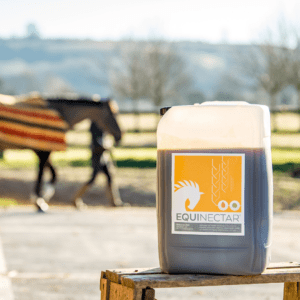
Ben Nedas
Chief Commercial Officer
The Impact of Summer Rainfall on Horse Digestion: Understanding the Risks and Changes
The United Kingdom's recent weather patterns, characterised by substantial rainfall followed by abundant sunshine, have led to a surge in grass growth. This rapid growth, while seemingly beneficial, has had unexpected consequences on the equine population, causing bloating and, in extreme cases, colic in horses. This article aims to shed light on the risks and changes to a horse's digestion related to this accelerated grass growth.
Grass is a staple in a horse's diet, providing essential nutrients and fibre. However, when grass grows too quickly, as it has due to the recent weather conditions, it can lead to digestive issues in horses. The primary concern is the risk of bloating and colic.
One of the key factors in this process is the change in the horse's hindgut bacteria following a large influx of fructans from the rapidly grown grass. Fructans are a type of carbohydrate that are poorly digested in the horse's small intestine and therefore reach the hindgut, where they are fermented by bacteria. This sudden increase in fructans can cause a shift in the bacterial population, with an increase in those bacteria that produce gas as a byproduct of fructan fermentation. This can result in excess gas production, leading to bloating and potentially colic.
In addition, some bacteria in the hindgut can ferment fructans into lactate, a substance that can lower the pH of the hindgut, making the environment more acidic. This can inhibit the growth of fibre-digesting bacteria and promote the growth of lactic acid bacteria, further increasing lactate levels. Excess lactate can damage the gut lining and lead to endotoxemia, a serious condition that can cause laminitis and colic.
The rapid grass growth can also lead to an overconsumption of grass by horses. The abundance of grass may encourage horses to eat more than their usual intake, leading to overfilling of the horse's stomach and potentially causing colic.
For more detailed information about fructans and changes in grass, please take a look at: Spring’s Green Peril: Navigating the Risks of Lush Grass and Colic in Horses
EquiNectar contains fructanase - the enzyme your horse uses to break down the fructans in grass. Providing your horse with additional fructanase, by feeding EquiNectar, should contribute to reducing the risk of fructan overload.
It is crucial for horse owners and caretakers to be aware of these risks, especially during periods of rapid grass growth. Regular monitoring of the horse's diet and health condition is essential. If a horse shows signs of bloating or colic, such as restlessness, pawing at the ground, looking at their side, and rolling, immediate veterinary attention is required.
In conclusion, while summer rainfall can lead to lush, green pastures, it's essential to understand the potential risks it poses to our equine companions. By staying informed and vigilant, we can ensure the health and wellbeing of our horses during these periods of rapid grass growth.
ABOUT EQUINECTAR
Description
EquiNectar® is a natural feed supplement, that is scientifically proven to:
- Re-balance your horse’s gut bacteria
- Help your horse maximise benefits from its feed
- Improve your horse’s condition
More information
EquiNectar® is produced by Tharos Ltd in the UK. It is a natural source of digestive enzymes and contains only the following ingredients:
- Our patented enzyme rich malt extract
- Medium chain triglycerides (from coconut oil)
- Potassium sorbate
For more details of the enzymes within EquiNectar® take a look at the ingredients and enzymes page.
How to feed
Simply add EquiNectar® to your horse's daily feed, using the Feeding Rate chart to determine the correct amount.
For detailed instructions about how to introduce EquiNectar, please read the comprehensive Feeding Guide page.





